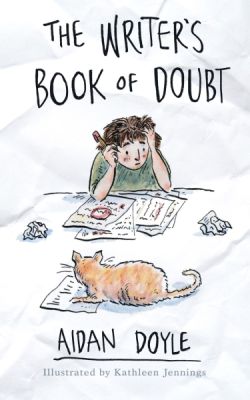Writing Advice
My stories have been published in a variety of places and I’m an Aurealis and Ditmar Award finalist.
The Writer’s Book of Doubt contains a lot of my advice on coping with rejection, finding motivation and making time for writing. It also contains essays from 22 guest writers providing consolation and advice for dealing with the writing life.

Read an extract: I Was Going to Write an Essay on Procrastination
Also see The Science Fiction Writer’s Hierarchy of Doubt
What I’ve Learned From Slush Reading at PodCastle
If you’re thinking about Kickstarting a book, see my article on Kickstarting an Anthology of Genre Stories
Making Time to Write
The most important thing for a writer: make the time to actually write. Writing: Find the Time Or Don’t (John Scalzi on making time to write).
How Finding Flow Helped Me Decide What I Should Do With My Life
Writing Workshops
Attending Clarion South, a 6-week science fiction writing workshop, was one of the most useful things to improve my writing. Not just in terms of craft, but also for making friends that are serious about writing science fiction. The workshop is based on the US Clarion and Clarion West workshops. I wrote an article about the experience. Six Weeks at Clarion South The workshop was held once every two years, but is unfortunately on hold indefinitely at the moment.
Writing Short Stories
Start the story when an interesting character is in trouble. Give them a difficult choice to make. End the story when there is some kind of resolution.
Most readers will respond better to a memorable character than a cool idea.
Make sure you choose the right viewpoint character. Are they active? Do they act rather than just react?
Avoid changing point of view.
What is the point of change in your story? Have you started your story there?
“Argument” openings (that explain what your story is about) can usually be cut.
Start scenes as late as you can, and finish them as early as possible.
Avoid flashbacks unless absolutely necessary.
Circular endings are a good way to end your story (where the ending inverts or echoes the opening).
Useful Advice: How to Write and What Not to Write
Strange Horizons: Stories We’ve Seen Too Often
Pixar: Story Rules
Andromeda Spaceways Inflight Magazine: A Comprehensive and Totally Universal Listing of Every Problem a Story Has Ever Had
Shimmer: Confessions of a Slush Reader: Why Should I Care?
Jack McDevitt: Twelve Blunders – How Aspiring Writers Get It Wrong
Nick Mamatas: How to End a Story
Elmore Leonard: Rules for Writers
David H. Hendrikson: Measuring Writing Progress
John Scalzi: Utterly Useless Writing Advice
Richard Harland: Writing Tips
Sean Williams: 10.5 Writing Commandments
Nathan Bradford: Writing Advice
Tobias Buckell: Writers and Pellets
Michael R. Underwood: 25 Secrets of Publishing
Susan Shapiro: 9 Ways to Crack into Major Markets With Personal Essays
Janice Hardy: Narrative Distance
Jim Butcher on Scenes and Sequels
The most common short story titles sent to Clarkesworld.
Querying Agents
How to Write a One Page Synopsis
The Complete Guide to Query Letters
How to Write a Query Letter for Non-Fiction Book
Writing Podcasts
Books on Writing
There are thousands of books on writing. Here are some of the more interesting and useful I’ve read (in no particular order).
On Writing: A Memoir of the Craft
Stephen King
Booklife
Jeff VanderMeer
Wonderbook
Jeff VanderMeer
Beginnings, Middles & Ends
Nancy Kress
Characters, Emotion & Viewpoint
Nancy Kress
The Elements of Style
William Strunk & E.B White
Story
Robert McKee
Story Engineering
Larry Brooks